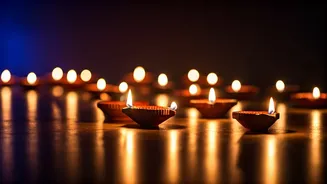Celebrating Diwali's Core
At the heart of Diwali lie tales of resilience, where light vanquishes darkness and good triumphs over evil. These stories, passed down through generations,
provide a strong foundation for the festival. The common narrative thread centers on the victory of light over darkness, symbolized by the many lamps lit during the celebration. These lamps not only illuminate physical spaces, but also represent the inner light of hope and positivity, encouraging people to conquer their inner demons and embrace fresh starts. This essential theme appears in stories old and new, and it is a reminder that overcoming obstacles is always possible.
Ancient Diwali Traditions
Ancient Diwali narratives, such as the Ramayana, demonstrate the celebration's deeper meaning. The return of Lord Rama to Ayodhya after fourteen years of exile and his victory over Ravana is a key Diwali story. This narrative represents the triumph of righteousness and the re-establishment of dharma. Another important tale revolves around the defeat of the demon Narakasura by Lord Krishna, symbolizing the eradication of ignorance and suffering. The lighting of diyas is a direct reflection of these stories, representing the welcome given to Lord Rama and the elimination of the demon's darkness. These age-old stories instill values like truth, bravery, and the importance of family, establishing Diwali's cultural significance in Indian society. They also serve as a timeless reminder of the power of faith and the victory of good.
Modern Diwali Narratives
Modern Diwali stories, while echoing the fundamental themes of hope and renewal, often reflect the social and cultural changes of modern India. These narratives often concentrate on contemporary challenges, such as individual struggles and communal harmony. They may include stories about overcoming personal obstacles, promoting education and equality, or highlighting the importance of environmental protection. These stories aim to engage a broader audience, emphasizing Diwali's relevance to the present day. While remaining linked to ancient traditions, these stories highlight the importance of adaptability and compassion, demonstrating Diwali's relevance to current issues. The festival's adaptable nature is shown by the inclusion of modern viewpoints that appeal to a younger and more varied audience.
Diwali's Cultural Impact
Diwali’s influence goes far beyond the stories themselves; it shapes cultural identity and strengthens community bonds. The shared stories foster a sense of belonging and reinforce fundamental values, such as family and compassion. Festivals act as a unifying force, encouraging participation from people from all backgrounds and faiths. The tradition of exchanging gifts, preparing delicious food, and decorating homes exemplifies the collective spirit of Diwali. The festival also emphasizes the importance of giving and aiding those in need, strengthening the spirit of community. Diwali's cultural impact is apparent in its capacity to bring people together, reinforce traditions, and provide a sense of continuity in a changing environment, resulting in a stronger and more vibrant society.
Hope in Modernity
In today’s fast-paced world, Diwali's themes of hope and fresh starts are more relevant than ever. The festival serves as a reminder to look beyond day-to-day challenges and embrace positivity. The celebration of light represents the resilience of the human spirit in the face of adversity. This perspective encourages individuals to view challenges as opportunities for growth and to pursue fresh beginnings. Diwali instills optimism, providing hope during times of uncertainty and inspiring people to overcome challenges with courage and determination. By concentrating on hope and renewal, Diwali gives people a sense of purpose and helps them navigate the complexities of contemporary life with optimism and resolve.















